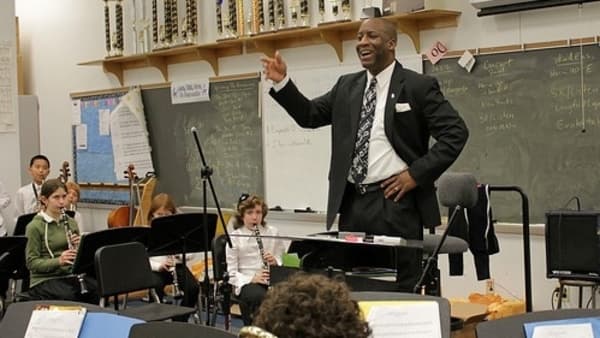Why school music teachers are heroes
Schoolteachers mold each new generation—what a responsibility. But when it comes to how we value educators who tops the list—the math or science teacher, the reading instructor or the basketball coach? In my book, music teachers are the heroes.
Imagine the cacophony—a roomful of teenagers just released from the internment of a desk in geography class, honking on a hodgepodge of different sized musical instruments.
While the music teacher tries to focus the students, he or she devises strategies to improve bow holds, intonation, vibrato, embouchures, sound production, and practice techniques. They search for inexpensive but playable instruments, interesting and fun literature, and approaches that include everyone—the talented, or those challenged by an injury or disability. But there is often backtalk: ‘Ms. Fine you never let us do what we want to do. Ms. Fine you are too strict. Ms. Fine can’t we play songs from Wicked instead of Tchaikovsky?’ (But you love March Slave!” Parents complain too: ‘Ms. Fine why can’t Joey wear jeans and sneakers to the performance? He doesn’t want to wear a tux jacket. Ms. Fine, Susie can’t make the rehearsals for the Christmas concert.
It’s only a matter of time—music students and mayhem go together. They are known for wreaking havoc and especially mischievous pranks. What bassist? Violin faces… Music teachers desperately try to convey the fragility of musical instruments. Warned to never leave their instrument in a cold or hot car, and to make sure cases are sealed enough that they don’t leak, many a young person in a moment of anger, or due to an accidental fall, smashes their instrument. “Mr. Wood, I accidentally stepped on my violin but my brother fixed it.” The teacher will spend every break trying to repair instruments. Otherwise the cost is prohibitive to already stretched budgets.

Someone stepped on it
Music or band rooms are crammed with risers, music stands, chairs, equipment and miscellaneous storage items. In fact, some music classes are housed in trailers, with low ceilings and cramped quarters. There is barely enough room to play. Band rooms are notorious for their cement block walls, blackboards, tiled floors, and other hard surfaces, which increases the sound levels in the space causing headaches, and the very real risk of hearing injury to teachers and students.
Today, politically correct language must be used. What to do when musical jargon is interpreted inappropriately? Phrases such as, “slide your finger towards the nut,” “go to P” (not pee, not pea, rehearsal letter P) or “the f-hole’ is the opening on the top of a stringed instrument,” are sure to cause trouble. I am reminded of the novice substitute teacher who attempted to shush a class. “Keep your eyes on your own parts.” This eliciting fits of giggles and graphic gestures from the boys. Flushing deeply, the teacher then said, “Ok let’s play the overture: The Battered Bride.” I mean The Bartered Broad.” I mean The Bartered Bride…”
 Music teachers are an extremely resourceful bunch. Playing is hard work. The instructor will reach out to find interesting literature, rhythm and note-reading games, quizzes and other online resources to help their pupils. They use every trick in the book to encourage and reward their students, which include citations, stickers, or awards for reaching various levels of success similar to Karate belts.
Music teachers are an extremely resourceful bunch. Playing is hard work. The instructor will reach out to find interesting literature, rhythm and note-reading games, quizzes and other online resources to help their pupils. They use every trick in the book to encourage and reward their students, which include citations, stickers, or awards for reaching various levels of success similar to Karate belts.
Nonetheless music teachers have to advocate for their subject. Parents have to be convinced of the importance of playing an instrument, and the benefits of private lessons. Private instruction opens the doors to youth orchestras or ensembles, and competitions, and these activities are attractive when applying for entry to a college. If a student is exceptionally talented, the pace of the group may hold them back. The analogy of seeking a “specialist” or private coach in order to make faster progress sometimes works.
Students or parents question orchestra directors. They ask, “How can you teach the trumpet if you don’t play the trumpet? The conductor’s job is to inspire and lead the group to play in a unified way and to explain musical interpretation. Fixing a problem, playing with good ensemble, practicing effectively, achieving a nice sound, good intonation and rhythm, are the same on any instrument.
Studies show that music study enhances other learning. Music teaches discipline, coordination, concentration, dexterity, empathy and creativity, increases attention, releases tension, and builds a sense of community.
Throughout civilization every culture has had musical traditions. It is an activity that brings people together regardless of age, gender, culture, ethnicity, or social status. It arouses, yet offers peace, joy and insight, and sometimes resolution. Music can console when words cannot.
Unsung heroes, school music teachers create magic every day. They deserve our undying gratitude.
March Slave Tchaikovsky, youth orchestra of Caracas (great playing and filming too!)
